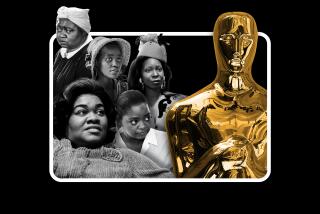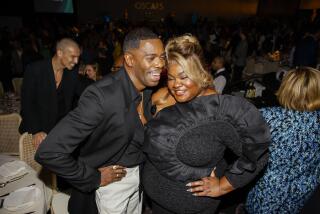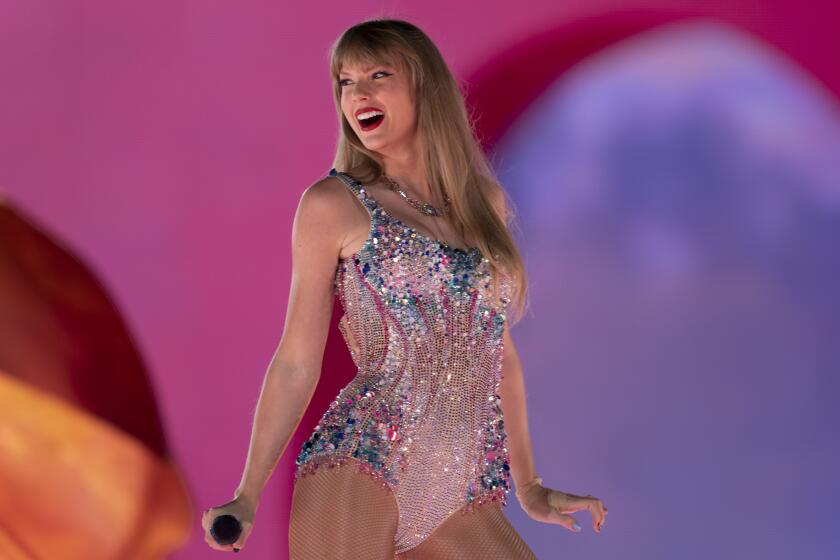Nominees need to be as polished as Oscar himself
In less than 12 seconds, Natalie Portman may have shattered every illusion fans had about her untouchable grace. Accepting a Golden Globe Award in January for her performance as a perfectionist ballerina in “Black Swan,” the pregnant, pink-satin-clad Oscar front-runner joked that her fiancé, the film’s choreographer, “totally wants to sleep with me,” and then unleashed a nervous braying sound.
Within hours, video remixes of Portman’s whinny-like giggle flooded the Internet. “More like dork swan,” said the website CollegeHumor.com, where the video “Natalie Portman Laugh Extended” was downloaded more than 1 million times.
Whether the young actress hurt her Oscar chances by appearing more oaf than ingénue remains to be seen, but Portman clearly dispelled any notion that she is an elegant heir apparent to Audrey Hepburn.
“She has done herself a disservice,” said Lisa Gaché, whose company, Beverly Hills Manners, offers etiquette classes at the Beverly Wilshire Hotel. “This is the time to convey a sense of gratitude and graciousness. Celebrities have to reserve the snorting or the sarcasm for behind closed doors.”
The Academy Awards, and the nearly six-months-long period of red carpet events, media appearances, parties and speeches that lead up to them, are Hollywood’s death march of manners. For nominees —many of whom are thrust into the microscopic scrutiny of awards season for the first time in their careers — this is a moment to shine or blunder in the eyes of fans, Oscar voters and the industry decision-makers who can give them their next job.
Newcomers to the circuit get tutelage from studios, agents, publicists and awards season consultants. Fourteen-year-old Hailee Steinfeld, a supporting actress nominee for her role as young avenger Mattie Ross in “True Grit,” participated in media training.
“You do mock interviews, and they tell you what to say and what not to say,” Steinfeld said. “But I still feel like I’m saying the wrong thing.”
Something of an Oscar season prodigy, Steinfeld has already mastered the red carpet stance — her default pose is shoulders back, one hand on hip, with a carefree wave. Red carpet peacocking is harder than it sounds — for decades after his first Academy Award nomination in 1973, Al Pacino looked wary and pained during the obligatory stroll past armies of camera crews that Oscar attendees must make into the ceremony.
“At every awards show, there are certain people who don’t want to be there. They’re ready to run,” said Steve Granitz, a WireImage photographer who will be shooting his 27th Academy Awards red carpet this Sunday. “But Hailee, it’s like she was born knowing what to do. She’ll blow you a kiss, kick up a leg. She’s very sweet and clearly appreciates all the attention.”
Contrast Steinfeld’s kicky charm with the slouchy discomfort of lead actor nominee Jesse Eisenberg. As “The Social Network” super nerd Mark Zuckerberg, Eisenberg’s awkwardness was a character asset, but on the red carpet, the actor’s tendency to stare at the ground with his hands in his pockets communicates the wrong message, according to Gaché.
“They think it looks cool,” she said of a generation of young male stars who share Eisenberg’s posture. “It gives them something to do amid the anxiety of the red carpet. But hidden hands give the impression that you’re covering something up. It’s a nonverbal cue that conveys a sense of insecurity. If they want to win, these guys should be exuding confidence.”
The analysis nominees endure has grown in recent years along with the number of outlets that cover awards season, and missteps that once would have been forgotten are now replayed ad infinitum online. Under such steady surveillance, nominees must walk a nearly impossible line, appearing at once authentic and impeccable.
One nominee who could teach a master class on awards season decorum is this year’s lead actor front-runner, Colin Firth, who knows both where to put his hands and how to open his arms to audiences as divergent as the retiree-heavy Palm Springs International Film Festival crowd and the young urbanite watchers of “The Daily Show.” Firth, however, may have an unfair advantage over his fellow nominees.
“We can never get enough of the British accent,” said Gaché. “America is a very casual society. The British actors tend to be much more formal. They’ve had classical training. They were taught how to conduct themselves in public.”
Historically, one of awards season’s dicier territories has been fashion, as actors struggled to express themselves in satin and tulle. But in the era of stylists, fashion gaffes have grown rare. Perhaps that’s why red carpet watchers were shocked by Helena Bonham Carter’s deliberately mismatched shoes — one red and one green — at the Golden Globes this year.
“I thought, ‘Why not?’ ” said Bonham Carter, who is nominated for supporting actress for her performance as Queen Elizabeth in “The King’s Speech.” “The red carpet is so ruled by fash-ism, and by that I mean F-A-S-H-ism, the fashion industry. Geez, can’t we just dress up and have fun?”
For an actress known for her eccentric roles — Bonham Carter is most recognized these days as the Harry Potter series’ villainous Bellatrix Lestrange — the bold declaration of independence was entirely in character.
“Actors are really playing a role at an event,” said Anne Ready, a media trainer whose clients include Disney and Warner Bros. “Just as they would for a character in a movie, they need to give thought to who they’re playing that night. If your purpose is to focus on your acting, mismatched shoes would be fairly distracting. But if you’re trying to make a statement about individuality, that would be the way to do it.”
After months of strenuous self-promotion, Oscar winners must surmount one final hurdle — deliver an acceptance speech that thanks the academy, their co-nominees, the real-life people who inspired their characters, their costars and crews, the executives and agents who got their film made and the families who cheered them on, ideally with polish and wit and in under 45 seconds.
“You have multiple audiences,” said public speaking coach Lisa Braithwaite. “It’s a balance, if there are people politically you need to mention, you also have to remember that the people who actually pay to see your movies are watching.”
To underscore the need for brevity, this year the academy gave nominees a practice DVD with a 45-second countdown timer and a video tutorial by two-time winner and Jedi master of the acceptance speech, Tom Hanks. Hanks recommends winners choose in advance who will accept for a group, and never take out a piece of paper to read from. “Reading a long list of names only shows us your bald spot,” he said in the video.
What makes Oscar acceptance speeches singularly challenging is that they are delivered to an audience composed largely of losers. Remembering that can help euphoric Academy Award winners avoid awkward moments like James Cameron’s “king of the world” speech for “Titanic” in 1998. What Cameron had intended as a display of his exuberance — holding up his trophy and quoting Leonardo DiCaprio’s line from the film — came across instead as arrogant to a room that had already seen “Titanic” win most of the Oscars they hoped would go to their own films.
“You want to be gracious winner because next year you might be the one whose movie’s butt gets kicked,” said Braithwaite.
Times staff writer Amy Kaufman contributed to this report.
More to Read
The biggest entertainment stories
Get our big stories about Hollywood, film, television, music, arts, culture and more right in your inbox as soon as they publish.
You may occasionally receive promotional content from the Los Angeles Times.






